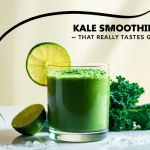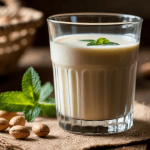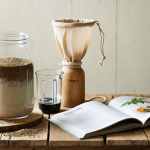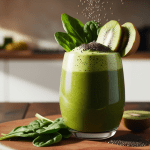
This improved recipe for Lacto-Fermented Lemonade takes the classic lemonade to new, healthful heights, incorporating traditional fermentation techniques for a drink that’s both tangy and loaded with probiotics. With each sip, you’ll enjoy the bright citrus flavors enhanced by a gentle fizz and subtle complexity from the fermentation process. Inspired by the best elements of traditional recipes, this version is easy to make and packed with beneficial bacteria, turning a simple glass of lemonade into a refreshing, gut-friendly treat. Perfect for cooling off and boosting wellness, this lacto-fermented lemonade is sure to become a favorite!
Ingredients
- 6-10 lemons (about 1½ cups fresh lemon juice)
- 3/4 cup cane sugar (adjust to taste)
- 1 cup whey (strained from yogurt) or 1 cup kombucha for a vegan option
- 4-6 cups filtered water
- 1/2 teaspoon fine sea salt (optional)
Instructions
Juice the Lemons:
- Squeeze the juice from the lemons until you have about 1½ cups. Strain the juice to remove seeds and excess pulp.
Prepare the Sugar Solution:
- In a large glass jar, add the cane sugar and about 1 cup of hot water. Stir until the sugar is fully dissolved.
Combine Ingredients:
- Add the lemon juice, whey (or kombucha), and enough filtered water to fill the jar to about 1 inch from the top. If using salt, add it now and stir well to combine all ingredients.
Ferment:
- Seal the jar with a tight lid or cover it with a cloth secured with a rubber band. Let it sit at room temperature for 2-3 days. You should see bubbles forming as fermentation occurs.
Strain and Bottle:
- After fermentation, strain the lemonade through a fine mesh strainer into another clean jar or pitcher to remove any solids or froth.
- If desired, you can add an additional 2 tablespoons of sugar at this stage for sweetness.
Refrigerate:
- Transfer the strained lemonade into flip-top bottles or jars, leaving some headspace. Store in the refrigerator, where it will continue to develop flavor over time.
Serve:
- Enjoy your lacto-fermented lemonade chilled! It can be served plain or mixed with sparkling water for extra fizz.
Notes
- The flavor will improve after a few days in the refrigerator, and it can last up to 2 weeks.
- For variations, consider adding herbs like mint or ginger during fermentation for added flavor.
- Always use fresh lemon juice; bottled lemon juice may contain preservatives that can inhibit fermentation.
This recipe provides a balance of sweetness and tanginess while delivering beneficial probiotics through fermentation, making it a delightful healthful drink!












